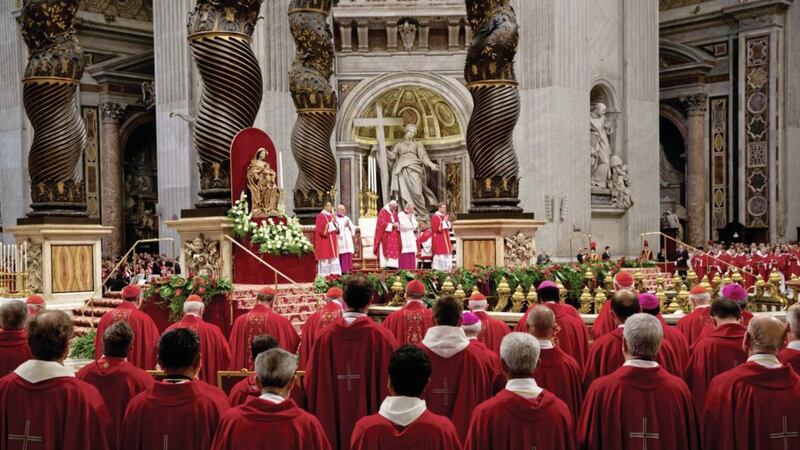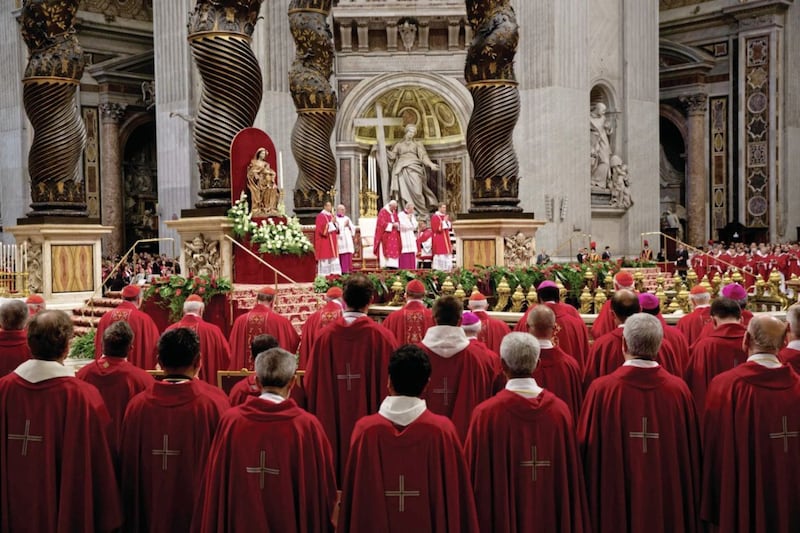AT the Feast of Pentecost, marked this Sunday June 4, we celebrate the coming of the Holy Spirit on the disciples, the event that is seen as marking the birth of the Church.
But the description of the descent of the Holy Spirit, as told in Acts 2:1-13, is significant not only for what it tells us about the beginning of the Church. It is significant also for what it tells us about God's Spirit, which we believe is with us at all times, and not just at the beginning of the Church's life.
That divine Spirit is described in terms of wind and fire. More specifically we are told that what sounded like a powerful wind, coming from heaven, engulfed the disciples in the house where they were gathered, and that what seemed like "tongues as of fire" settled on the head of each of the disciples.
Both of those expressions of the Holy Spirit are important. But they are important above all, I think, for the way they differ from what we normally think of when we hear of powerful winds and fires.
Usually in life, when we hear of powerful winds and storms and the like, we think of the destructive side of nature, causing havoc, sweeping people off their feet, destroying whole buildings or even sinking ships.
And fire of course is well-known for its destructive potential, something we are reminded of dramatically when wildfires devastate whole areas of countries.
But the powerful wind at Pentecost wasn't destructive. It didn't blow the disciples off their feet and cause chaos and confusion.
It seems rather to have literally inspired them to go beyond their individual selves and connect with other people. It gave them the confidence and the ability to do so, without fear.
And the tongues of fire didn't burn them or harm them in any way. Rather, as with the inspiring wind, the tongues of fire seem to have actually enabled the disciples literally to find their voices and communicate with people they would normally not have been able to speak to, because they all spoke different languages.
We know the expression 'to lose your tongue', used when someone suffers a terrible shock and momentarily at least loses the ability to speak.
Pentecost was exactly the opposite. As the result of the coming of the Holy Spirit, the disciples didn't suffer a nasty shock that rendered them speechless, but on the contrary they felt encouraged and enabled to speak in ways they would been incapable of before, and to reach out to people who were previously, we might say, on a different wavelength from them, and address them in ways they could understand.
It's important here, however, not to get the wrong end of the stick. Pentecost isn't a kind of show-stopper that should leave us all gasping in amazement at the fact that people were suddenly speaking in various different tongues they hadn't known before.
I don't think the true meaning of Pentecost is to present us with a sensational display of astonishing, almost miraculous, talent that we should then applaud.
The true meaning of Pentecost is much deeper. It is about showing us the reality of God and God's connection with human beings.
And it's about showing us how human beings can connect with one another when they are inspired by the Spirit of God, which doesn't destroy but creates.
The bad news of the human condition, if you like, is that finite, limited, individual human beings, which we all are, have difficulties connecting with each other at all levels, not just at the individual or private or personal level, but as communities, as nations, as power blocks with varying ideologies or political beliefs, as various language groups and so on.
And yet we know that life is only humanly good and satisfying when barriers and frontiers between people and groups can be overcome, and we can work together for the benefit, ideally, of all.
What the Feast of Pentecost teaches is that those ideals of human co-operation can become possible in reality if we allow ourselves to be guided by the Spirit of God.
Indeed, it goes further. It suggests that these ideals can become possible only if we allow ourselves to be guided by the Holy Spirit of God.
And that, in turn, is just a roundabout way of saying that our final destination is not to be found here on earth, but in heaven with God.
Or, to put it slightly differently, that God does not wish to exclude his creation from his life but to offer us all a share in his divine life, beginning in the here and now but continuing, like God himself, for all eternity.
:: Martin Henry, former lecturer in theology at St Patrick's College, Maynooth, is a priest of the diocese of Down and Connor.





